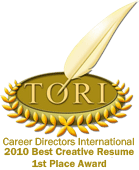An ineffective resume comes in two flavors: too generic and too specific.
The generic resume
Have you thought or heard yourself say:
- “I don’t want to narrow my focus in case I would leave out possibilities.”
- “I don’t really know what I want to do next, so let’s write a resume and see what happens.”
- I’ve been doing the same thing for so long, if I just list what I’ve done, they’ll get the idea.”
This approach is lukewarm and noncommittal. It is saying “I don’t want to do the work it’s going to take to make a good choice for my life and work.”
The too specific resume
On the other hand, a resume can also be too specific. This might sound like:
- “I don’t know what I want to do, but if I list all the details of all my projects in all my jobs, they’ll know.”
- “I want another job just like this one, so all I have to do is make my job description look like a resume.”
- “If I give them as much information as possible, they will think by sheer weight of the application, that I am qualified.”
These assumptions tend to run to the overload end of the spectrum, but surprisingly, they avoid work and commitment just like the first list. Most hiring managers know a line when they see one. Even more know when they see a whole bunch of lines.
The just right resume
This approach acknowledges resume writing as a process that takes decisions, commitment, and follow-through.
- Decide on the target of your search. In short, what do you want to do next?
- Make a list of the reasons you want it. Is it a new house? College education for your children? Better working conditions? Write the reason(s) on your bathroom mirror and read them aloud to yourself every morning and every night. Commit yourself to obtaining your goals. I know it sounds woo-woo, but trust me on this one. What we think about is what we get and where we go. Think about the things you really DO want.
- Follow through. Write your resume. Include your target in the form of a resume headline. Align all of your information and especially your accomplishments with your target.
Most people start with Step 3, forgetting the target and commitment. Often, the result is a long and frustrating search or worse, a job that doesn’t fit the jobseeker’s needs. Don’t write a resume that will hurt you. Follow the steps in order to career success.









